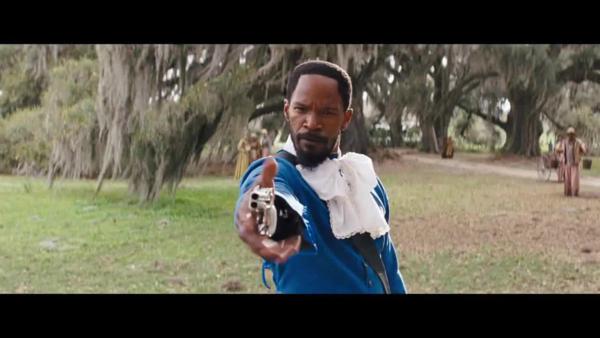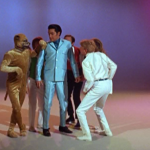Django Unchained

2012![]()
Written and directed by Quentin Tarantino

There will be SPOILERS for Django Unchained below the fold. If you don’t want to get spoiled, please read one of our many other fine reviews and come back later. Thank you.

Quentin Tarantino works his way through movie genres with the “Southern” Western Django Unchained, which has led a lot of people to have blood shoot out of their nose as they freak out, because we can’t have a decent discussion about race in America. Though I’ll prefer a violent movie causing people to speak about race as opposed to the usual violent act that makes people talk about race. But that’s just me, a dude who doesn’t like dudes getting killed.

But before we get to the slavery and the violence, let’s talk about Westerns. At one time, they were the most popular genre of film in America, and were produced by the truckload. Most were cheap oaters with simple tales of easily defined heroes and villains, everyone lily white, even actors portraying Indians. Eventually, stories became a bit more complex, some of the rougher aspects of the Old West started to be acknowledged in the tales both on TV and cinema. Westerns moved from pulp action into tales of legends, literally becoming epic tales of heroes on the screen battling very evil men as the body count piles high. America is a young country, and the Old West became a place where our own stories appeared (and in another American tradition, they are violent!) The Old West is a cruel world, and Westerns have stopped glossing over all the muck, the casual racism, the poverty, the lives of the working girls upstairs, the harsh mistress that was the open prairie. Django Unchained itself is an epic tale of legend, even referencing a legend itself during the film (Schultz tells a tale of Siegfried from Nibelungenlied.) Like all good legends, things are exaggerated, heroes go through trials, and loved ones must be rescued.

As Tarantino previously did with Inglourious Basterds, there is punishment to be dished out on bad bad people. What starts out as a tale of a bounty hunter quickly becomes a rescue mission and violent revenge fantasy, but without the literal floating head of avengement taunting the doomed. Instead, Django returns from the sentence of death, and personally taunts those he kills.
One thing people criticize Tarantino for is the amount of violence in his films. But instead of focusing on how violent his films are, I prefer to think about how so many other films are sanitized of their violence. In a Tarantino film, when someone is shot, blood splatters everywhere. Body parts are ripped to pieces. The violence happens on screen, and we see it all. Violence is…violent. Tarantino is honest in that he doesn’t sugarcoat it. Similarly, there is no holding back in the depiction of slavery. The entire shameful process is shown onscreen. The whippings, the brandings, the chain gangs, the hot box, the comfort women, the masks and spiked collars, the disregard for blacks as anything except cattle that picks cotton. Or kills each other as their owners bet money, as the plot leads into. People compare Django Unchained to Roots, but Roots was made for tv, sanitized but groundbreaking for the time.

By many people back in the days of Django Unchained, blacks weren’t even considered human when they were free. The shocked looks as people see Django riding a horse. The causal dropping of the n-bomb. We see the different classes of slaves – house, field, comfort women, decoration, fighting. The hierarchy, the levels of comforts given. The goal was to divide the slaves up so they fight amongst themselves instead of organizing. Keep them ignorant, keep them scared that they’ll lose what little they have. The methods speak of a greater evil, the masters knew that the slaves were capable of more, and actively suppressed it for their own benefit.
Django is rescued from his slavery by a bounty hunter named Dr. King Schultz, who needs Django to identify some wanted men. Schultz plays a traveling dentist, though he hasn’t done that job in years. His work is in the flesh trade – dealing in dead bodies instead of working bodies, a higher-plane parallel to Calvin Candie. But while Candie lives a life where he lords his power over the helpless, Schultz rationalizes his mission as punishing the guilty. Indeed, the men he goes after are bad men who did bad things. Schultz has a sense of right and wrong, and of justice, though is not adverse to gunning down a man in front of his child for crimes he did long ago.

In gratitude to Django’s help, and a sense of moral duty (as he freed Django, he feels that he is responsible for him, a White Man’s Burden), Schultz agrees to help Django find out what happened to his wife and try to acquire her. Then it becomes going undercover to save her from the notorious Calvin Candie. As they begin their undercover mission Dr. Schultz becomes more and more out of his character of the bored rich man looking for a fighting mandingo. Schultz sees the brutality against man perpetrated by Candie, beginning with the first slave fight and the increasing levels of awfulness as they go through Candieland. Dr. Schultz begins to give himself away more and more, covering it up with a concern that Django will break character. In the end the horrors are too much, Schultz refuses to even see Calvin Candie as a human, but as a monster, and can’t pass up the chance to rid the Earth of him, even at the cost of his own life. Christoph Waltz rivals his Colonel Hans Landa, a friendly soul who can turn into a killer at a moment’s notice. But while Landa had no moral qualms about anything he does and looks out for himself alone, Schultz follows his moral code. And that gets him killed. Schultz knew it would, and accepts his fate, knowing he went out taking down a great monster.

Leonardo DiCaprio is brilliant as the genteel southern gentleman who is also a brutal taskmaster who lives on the backs of exploited people sold as livestock. Calvin Candie takes joy in his power over others, takes joy in his life of opulence lying on the backs of other. He tries to lord knowledge over others, sees himself as a real cultured genius. He even has a French fetish going on, but can’t be bothered to learn French, and gets angry at those who speak it in front of him, seeing it as an insult to his intellect. At the dinner table, Stephen stands right beside him, gut busting laughing at everything Calvin says. Even his “friends” are too scared to not laugh at his jokes. Django called it when he called that Calvin’s lawyer was raised to be his slave. Everyone serves Calvin. That’s how he likes it.
Sam Jackson gets his Uncle Ruckus on as Stephen, the head house slave at the Candieland Ranch. Stephen has more power than his slavery would hint to. He practically raised Calvin, and can get him to do what he wants. Most notably seen during the library scene where he lets Calvin know he’s being had. Stephen also manages to convince everyone not to torture and lynch Django, coming up with a far worse fate. That alone is astonishing, as a slave rebellion was always the worst fear in the mind of any plantation owner, and extreme measures were taken to punish and subjugate knowledge of their occurrence, lest they inspire more uprisings.

Like every other Tarantino film, references in Django Unchained go by faster than can be spotted in one viewing. There are homages to both old school oaters and Italian epic tales. There are references to Southern plantation flicks like Gone With The Wind, Mandingo, and Birth of a Nation. Horse tricks from those old singing cowboy flicks (though no “Wonder Horse” in the cast list!) Even the theme from Django and Django himself, Franco Nero, show up. Part of the fun is finding out which films were cribbed from, or reading accounts of how Tarantino is brilliant for doing something directly lifted from a 40 year old film. Say what you will about Tarantino, he knows his cinema. He knows how to make good cinema. And he made good cinema.

Rated 8/10 (whipping scars, engravement, beer, silent, the OG Django, blood on the cotton, spying, little boy blue dispenses justice)
Please give feedback below!










2 Comments
Tyler miller
October 29, 2018 at 9:18 pmReally curious to hear your thoughts on THE HATEFUL EIGHT. great review as always. I love random your selection of reviews are. Keep up the fab work.
Tars Tarkas
November 12, 2018 at 11:04 pmI liked Hateful Eight and thought it was one of Tarantino’s best, but I’m worried it won’t hold up as much on rewatches as I’ll already know the dynamics, though I haven’t watched it again to be sure. I’ll probably end up seeing it again eventually but won’t know until then.